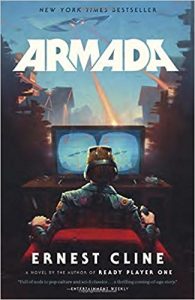 Most bad books have some redeeming feature. This one doesn’t. Ernest Cline’s first book, Ready Player One, was quite good for what it was—an exercise in Eighties nostalgia, aimed at people like me who came of age in that golden time. Armada is an attempt to further capitalize on that nostalgia, but it’s more reminiscent of a creepy, jobless stalker who skulks every night outside his ex-girlfriend’s apartment, begging her to give him one more chance, because, after all, didn’t it used to be so good?
Most bad books have some redeeming feature. This one doesn’t. Ernest Cline’s first book, Ready Player One, was quite good for what it was—an exercise in Eighties nostalgia, aimed at people like me who came of age in that golden time. Armada is an attempt to further capitalize on that nostalgia, but it’s more reminiscent of a creepy, jobless stalker who skulks every night outside his ex-girlfriend’s apartment, begging her to give him one more chance, because, after all, didn’t it used to be so good?
I’m not going to spend a bunch of time on this review, but I do feel obliged to warn readers, as if I were a ghost rider from Johnny Cash’s song, so you may avoid my errors. Armada’s story is wholly derivative. It takes a few famous science fiction stories (primarily Orson Scott Card’s Ender’s Game and the movie The Last Starfighter, which (shhhhh) I saw in the theater when it first came out). Then it mixes them together to create something that is much less than the sum of its parts. I spent nearly the entire book thinking that this couldn’t be it—soon, very soon, the author would pivot to something creative and original, and there would be a clever and interesting plot twist. Nope.
Every single character is a simplistic caricature. Leaving aside the hero, a wish projection fantasy of geekiness, all the other characters are a fifth grader’s version of humanity. And Cline’s treatment of women is just disturbing. The hero’s mother—she’s hot, hot, hot, but chaste for her long-dead husband, of course, when she’s not busy catering to her son’s every wish and encouraging him to play video games and smoke weed instead of studying. His proto-girlfriend—she’s hot, hot, hot, and instantly falls for the hero because of his trivia knowledge. She plays video games, too, at least when she’s not busy catering to the hero by massaging his ego and proffering herself to him. If there are any other female characters, I missed them. But I’m certain they’re also hot, hot, hot, and wholly focused on pleasuring the hero.
Then there’s the aggressively offensive stupidity of every element of the story. You see, the alien invasion is Richard Nixon’s fault—when he came across alien life on Europa, he immediately ordered its (unsuccessful) destruction with nuclear weapons, presumably because Watergate. Naturally, Earth “wins” by unilaterally abandoning the fight (at the sole option of our teenage hero, who also kills Earth’s military high command for good measure) and destroying its weapons, showing the aliens we want peace (after tens of millions of humans are first killed and all our cities destroyed). Snake oil salesmen Michio Kaku and Neil deGrasse Tyson are presented as the greatest scientists on earth, with enormous political authority ceded to them by all world governments. (On the other hand, Bill Nye makes no appearance, so I should be grateful for that.) And the amount of ignorance revolving around the military is unbelievable, especially given that the entire book centers on the “Earth Defense Alliance,” specifically organized just like the current United States military. Apparently admirals are on top—then the next rank, repeatedly emphasized as one of the highest and extremely rare and prestigious, is lieutenant. Didn’t anyone edit this book?
Now, reading what I’ve just written, it occurs to me that maybe this book is so bad it’s meant as a joke. Maybe it’s meant as a joke on the reader, though that seems a bad strategy for an author obviously dying to be popular. Or maybe it’s meant as a parody of Ready Player One, where the originality of that book is withdrawn and substituted for with stupidity, but the nostalgia remains and is applied thickly with a trowel. After all, if some nostalgia is good, more must be better. I doubt it, though. I think Cline was just so desperate to repeat his earlier success that he stuffed this rotten mash into a sausage casing, deep fried it, covered it in mustard, and presented it to the reader as a new gourmet dish. No thanks.
